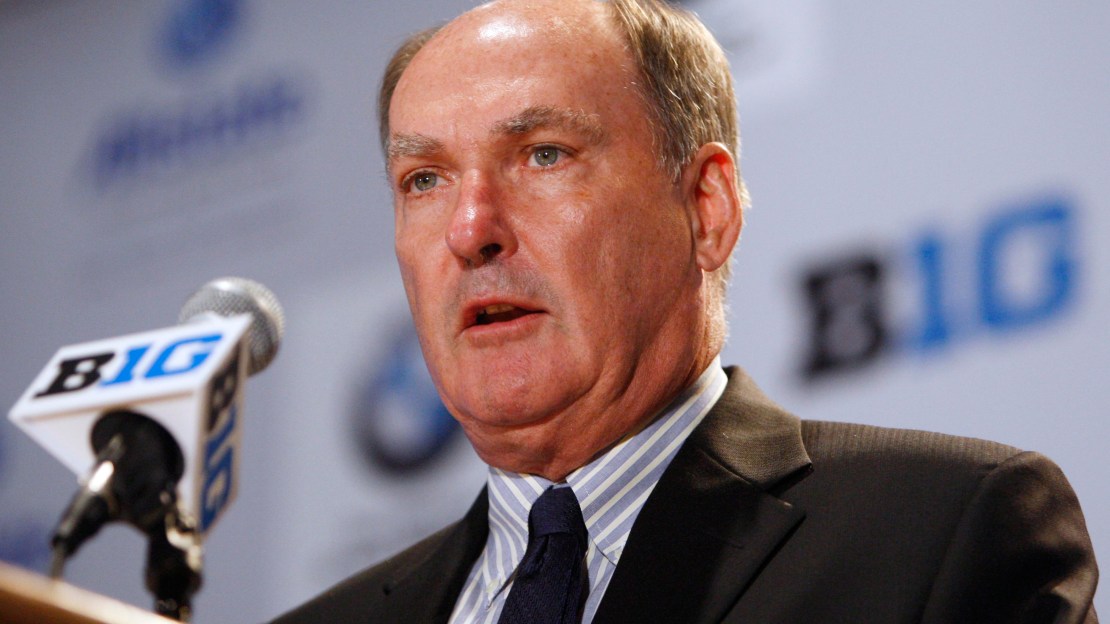BTN.com staff, June 13, 2012
(AP) — The conference commissioners who have been working on a four-team playoff to determine college football's national champion plan to present the BCS presidential oversight committee multiple formats from which to choose.
Pac-12 Commissioner Larry Scott said the university presidents will "have options – plural" to consider when they meet in two weeks. Scott spoke before leaving Wednesday's meeting with conference commissioners and Notre Dame's athletic director.
What those options are is not clear. This is.
"Status quo is not on the table," BCS executive director Bill Hancock said.
The commissioners have since January been working on ways to hold a four-team major college football playoff, starting in the 2014 season. Among the details that need to be worked out are when and where to play the games, how to incorporate the bowls, and how to select the four teams.
The BCS commissioners and Notre Dame AD Jack Swarbrick released a statement after the meeting saying they are "approaching consensus on many issues and we recognize there are also several issues that require additional conversations at both the commissioner and university president levels.
"We are determined to build upon our success and create a structure that further grows the sport while protecting the regular season. We also value the bowl tradition and recognize the many benefits it brings to student-athletes. We have more work to do and more discussions to have with our presidents who are the parties that will make the final decision about the future structure of college football's postseason."
The commissioners are scheduled to meet again next week in Chicago and the presidential oversight committee is set to meet June 26 in Washington.
Scott would not say if the so-called "plus-one," which sets the No. 1 vs. No. 2 title game after the bowls have been played instead of before, is still on the table – as he has suggested previously.
"I think there's a focus on a four-team playoff and trying to find a consensus as to the best way that could work, that our conferences can be comfortable with, that our presidents can consider," Atlantic Coast Conference Commissioner John Swofford said. "But I don't think you cut off all conversation of the (other) models that can be in play. I think the presidents certainly have every right and opportunity to talk about what they need to talk about."
The commissioners last met in Florida in April.
"The reality is that I felt that we made progress on several issues – several difficult issues – and that we need to go back to our leagues and talk about that, go back to our presidents and talk about that," Southeastern Conference Commissioner Mike Slive said. "I thought that we were quite general when we were in Florida at our annual meetings, and I thought we regained the focus today and last night on specific issues and got a lot of consensus."
How a playoff will work is not so simple to figure out.
The bowls are likely to be involved in some fashion as hosts for the semifinals, possibly on a rotating basis or by using the traditional ties between conferences and bowls. The championship game site is likely to be bid out like the Super Bowl.
Then they also must figure out how the teams will be selected: Polls? Computer ratings? A selection committee? A system that emphasizes conference champions or one that allows conferences to place multiple teams in the playoff? Or a combination of all of the above.
And what about the independents?
"They're discussions about everything from the dates to the sites to the who to how," Hancock said. "It was all talked about today in a very productive way, and it was decided that each commissioner now needs to go talk to his presidents."
Whatever they come up with, it probably needs to be done by the fall, when the BCS opens a new round of television negotiations. Hancock said that's the goal, although it could happen after the season. He also pointed out that the networks could balk at the plan. That seems to be an unlikely scenario, but BCS officials have been very careful throughout this process to avoid over-promising anything.
"This won't be resolved until after the package goes to the television market," Hancock said. "The TV people might say, `We don't want to buy that package.' Then, our guys might say, `Fine, we'll do something else.' It could be awhile before the future of the game is known."







